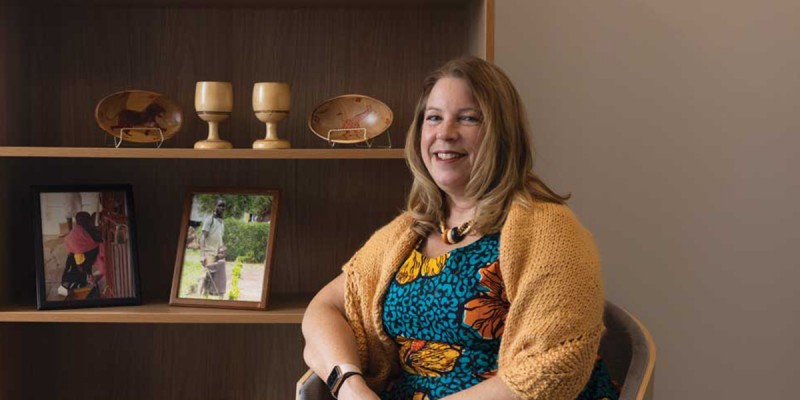Bettering lives by listening
Building a pharmacy program for Uganda

After a decade helping pharmacists at clinics and hospitals in Uganda improve healthcare and cultivate a new generation of pharmaceutical care experts, KarenBeth Bohan has learned to value a very simple lesson: Let your patient tell you what’s wrong.
Basics like these are what Bohan, professor and interim associate dean for education and engagement in Binghamton University’s School of Pharmacy and Pharmaceutical Sciences, hopes her students take from classrooms to clinical work and into whatever careers they pursue in a rapidly evolving medical field.
Bohan’s mantra is further explored in her blog, “Out of the Pharmacy Classroom and Into Africa,” which delves into her work developing a learning and serving experience for pharmacy students in Uganda.
Working in Uganda, Bohan has helped craft and refine research advancing pharmacy education to improve safe use of medication and overall patient health. With obstacles ranging from limited availability or lack of some of the latest medications to accessibility of clean water, Bohan says colleagues there have learned how to accomplish more with fewer resources.
“Listening to the patient is one of the primary things you need to do and today, it’s very easy to just do all sorts of medical tests like MRIs or lab work and let those results tell you what’s wrong with the patient, but in Uganda they don’t have access to all those things,” Bohan says. “They’ve learned how to really pay attention to the symptoms and listen to what the patient is saying. You can really do a lot with that information, and that’s something I’ve taken back to my American pharmacy students.”
While Bohan has honed her expertise in infectious disease pharmacology and global pharmacy education over the past 24 years, the past six at Binghamton, an early foray into the medical field almost took her career in a different direction. When she was 16, she volunteered as an emergency medical technician in her native Laurel, Md. She continued as a medic through her first year of college.
“When I started doing bigger ambulance calls and being the lead, this one time there was a really bad accident between a motorcycle and a vehicle, and that was a difficult situation to get through,” she says. “After that, I didn’t think I could do that for the rest of my life.”
That’s when a friend casually asked, “What about pharmacy?”
Knowing little beyond what she’d seen in retail drug stores, Bohan spoke with local pharmacists about how they enjoyed their jobs. Their enthusiasm convinced her to enroll in pharmacy school at the University of Maryland, Baltimore. She found a new path.
“Pharmacists can work directly with patients and health providers in the hospital setting,” Bohan says. “They can help monitor drug therapy and recommend lab tests and talk to patients about how to get the best effects from their drugs.”
Bohan’s professional path took another unexpected turn in 2011, when she was working at Wilkes University in Pennsylvania. An anthropologist visited her office and asked, “How’d you like to go to Africa with me?”
He was working on a rural water improvement project in Uganda and an expert like Bohan, with her knowledge of health and waterborne infections, would be a valuable addition to the research team. Once there, Bohan began a collaboration with a Ugandan pharmacy school and its students as part of her initial work on that water sanitation project.
“What I’m trying to do now is help them build a curriculum in their pharmacy program so that students know how to work with patients at a higher level and how to work on a team with doctors,” Bohan says. “They’re recognizing that clinical pharmacists can be very helpful in a hospital setting, so that’s actually a huge change.”
Bohan says there is plenty more work ahead, and while she regularly keeps in touch from Binghamton, she’s hoping to return there next summer.
“Uganda is in the very beginning of clinical pharmacy. They need pharmacists to step up and go find physicians who want to work with us,” Bohan wrote in her August blog post. “No, they are not going to pay you. Yes, the work is hard and you will not always be appreciated, but there is someone who will: the patients.”
